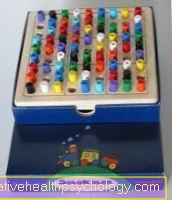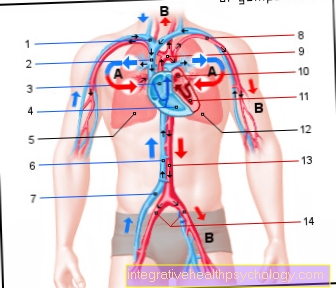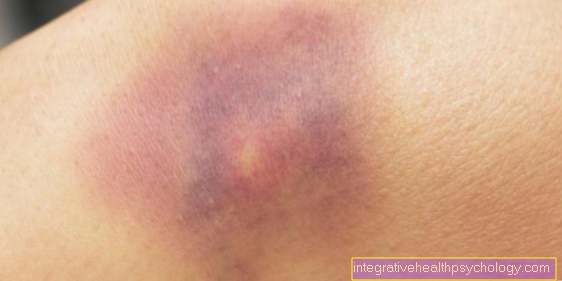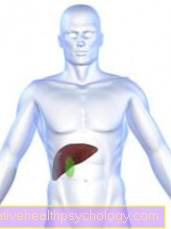Poor concentration
Synonyms in a broader sense
Poor concentration, lack of concentration, problems concentrating, poor memory, forgetfulness, lack of concentration, hyposthenuria, distractibility, poor brain performance, rapid fatigue, attention deficit, inattention

definition
In order to be able to define a lack of concentration, the term "Concentration" will be described first. Concentration is the ability to focus all of your attention on a person or an object.
The Ability to concentrate is not from birth to a certain extent firmly present, but represents one Maturation process Being able to concentrate has to be learned, so to speak. This can be done while playing, in kindergarten or at school. The fact that both the duration and the intensity of the concentration phases can be increased is reflected, among other things, in the fact that both factors increase with increasing age. While a six-year-old child can only concentrate on working for a period of 15 minutes on average, a 14-year-old can work for about twice as long.
Improvement in poor concentration
In order to improve an existing concentration disorder, concentration games are particularly advisable. For this purpose, we have developed a game in cooperation with a game manufacturer, which can playfully promote concentration.
Through the combination of concentration and play, various goals can be achieved very well.
We particularly value the high quality and workmanship of this game.
You can also find suggestions for memory training on our website memory and learning disabilities in children
Symptoms

In principle and purely in terms of appearance, is one Poor concentration difficult from one Weak will to distinguish. Unfortunately, it is still often the case that a child with poor concentration is accused of: “You don't want it at all!”
In both cases is the inner Urge for variety stronger than the ability to persevere. In principle, children with poor concentration need constant control bodies that make them dwell on one and the same activity. However, this is not to be equated with permanent nudging. Ideally, the child should be made to do this themselves. Under certain circumstances, however, this is quite a long road, which should result in a child learning on the one hand to focus his thoughts on one thing and on the other hand not to take into account all external stimuli that could disrupt this focus.
Depending on the causes, it can be seen that this great goal can, at least in some cases, even be easily achieved under certain circumstances.
Difficulty concentrating constantly or in phases occur.
Constant lack of concentration
A permanent lack of concentration can be caused by the fact that more profound problems available, Functional weaknesses in the brain are present and for example a ADS or ADHD present. In these cases one is separate diagnosis necessary that turn individual therapeutic measures entails (see: ADHD test).
Possible ADD and ADHD - typical symptoms:
- short phases of attention and related: quick distractibility, forgetfulness and changeable behavior.
- under certain circumstances: spatial instability (mixing up the sides (right - left) and, associated with this, mixing up letters, similar sounding sounds, etc.)
- Cramped hold of the pen
- Problems in fine motor skills
- Developmental delays in the area of mobility (learning to crawl late, walking, ...)
- Difficulties in contact or inconsistent friendships (lack of distance, isolation, frequent conflicts, ...)
- Problems in performing everyday actions in a controlled sequence,
Possible and typical ADHD symptoms:
- long phases of crying in infancy (also: often bad mood, defiant phases)
- Problems sleeping, trouble eating
- acquisition of the language very early or rather late
- Fidget, can't wait
- Tasks are not finished. Lots of unpredictable plot changes)
- Inability to stay seated for a long time (restless behavior). Rejection of physical contact
- Usually: playing loudly
- Talk into it
- hasty speaking ("rumbling")
- Compliance with the rules of the game is very difficult
- Injustice is difficult to endure ("sense of justice")
- Clumsiness
- common: low self-esteem. Sometimes this can lead to fears and depression in adulthood
- ...
Possible typical ADD symptoms:
- Daydreams
- mental absence even when speaking directly
- "Not listening"
- It is difficult to carry out work in a timely manner.
- forgetfulness
- Details are only perceived imprecisely.
- Lots of careless mistakes
- Avoiding strenuous (high-concentration) tasks
- very calm, often gives the impression that “everything doesn't matter”.
- easy influenceability
Partial lack of concentration
As a rule, a lack of concentration occurs “only” partially. This temporary lack of concentration On the one hand, it can repeat itself again and again in certain situations, but it can also occur again and again within the daily or weekly rhythm.
In addition, the attention of children who are partially poor in concentration is enormous depending on the motivation. In everyday life, for example, it is noticeable that - if the subject and the situation are classified as "interesting" by the child - the child is quite able to concentrate and, moreover, to listen persistently or to cooperate.
causes
According to the distinction between permanent and partial lack of concentration (see symptoms), different causes can also be named from this distinction.
Causes of permanent lack of concentration:
The permanent lack of concentration is usually due to a dysfunction in the brain and other physical or organic causes.
Constantly poor concentration children often suffer from overstimulation that they cannot escape independently. Short phases of attention and the associated quick distraction, forgetfulness and changeable behavior can be the result.
These symptoms alone are not an indication of the presence of ADD / ADHD. For more information on these two syndromes please click HERE: ADS or ADHD.
Causes of partial lack of concentration:
The partial lack of concentration however, it can have various causes. Possible causes include: Ingestion of Amitriptyline and other antidepressants (Mirtazapine, Citalopram, Imipramine.
Allergies
Here, too, the following applies again: One is not mandatory allergy Trigger for a lack of concentration or attention. This is made clear, among other things, by the fact that not every allergy sufferer is inevitably poor in concentration or attention. But there are two possibilities that make an allergy appear possible as a cause.
- The allergy triggers a permanent stressful situation, whereupon the body or the adrenal cortex causes adrenaline to be released. About half an hour after an immense release of adrenaline, the body reacts with increased cortisol production. Cortisol in turn belongs to the group of so-called Glucocorticoidswhose central effect can influence the brain and memory performance, as well as a change in behavior.
- As a result of an allergy, drugs are taken to alleviate the symptoms, the side effects of which indicate that perception and the ability to concentrate may be weakened.
In this respect, phosphate sensitivity / phosphate hypersensitivity is repeatedly considered as a possible cause for the development of a lack of concentration, possibly even an attention deficit syndrome with or without hyperactivity.
Phosphates are components of detergents and fertilizers, but can also be found in finished products, fizzy drinks, beer and wine, and in bread.
Organic phosphates are also found in our body in the form of intracellular electrolytes (calcium phosphate) in certain concentrations. This is one of the reasons why it is phosphate-free diet also controversial in the context of therapy.
Beginning diseases
This means the classic “hatching” of a disease. Feeling unwell or feeling unwell can weaken or cloud your attention. However, these symptoms should quickly disappear as soon as the disease has been overcome.
The diseases do not have to be limited to physical illnesses. Too often, mental illnesses are also the cause of incipient lack of concentration. In adults, for example, a lack of concentration is in many cases an indication of the onset of burnout syndrome.
Problems
Problems preoccupying the child's mind, e.g. family problems, personal problems, special events, ...
"Where are you with your thoughts?" Who hasn't heard this question? There are problems that are so current that it is difficult to get rid of them. There are situations in which it succeeds, then again you are not able to form a clear thought. Here, all the therapy suggestions for increasing the ability to concentrate are of little use. It is important to get a grip on the causes of the problems. Problems cannot always be solved, and in some cases you have to learn to live with them.This is often only possible with outside help, which you should take advantage of as soon as you realize that you are overwhelmed with the situation as such.
Stressful situations that may impair the children's concentration are, for example:
- Separation / divorce of parents
- Illness of loved ones
- Grief (
pressure
External pressure exerted on the child, e.g. excessive demands by parents
"My child should have it better for once"
That is still often the maxim floating around in the minds of parents. Understandable on the one hand. Incomprehensible if the child suffers from it.
Always keep in mind that whatever you want your child to do is to be done. Act according to the motto: less is more, for example when it comes to leisure activities (see below). Be patient and always be there as a contact person, even and especially if your school performance does not meet your expectations.
Excessive demands - even if you do not express them directly in front of the child - manifest themselves in your behavior and have a direct or indirect effect on your child's behavior. Your child wants to live up to your expectations and is all the more frustrated when they fail. frustration creates an unwillingness to learn or an impatient striving for improvement. Both of these cause problems in the child, and childish problems are often the cause of learning problems, above all the lack of concentration and the striving for recognition.Heavy / excessive sugar consumption
In the 1990s, studies showed that high sugar consumption didn't just affect the body health who has teeth and weight, but that from an excessive consumption of sweets next to you Vitamin deficiency concentration problems were often triggered.
Bad learning situation
In order to be able to work and thus concentrate, you need a learning environment that allows concentration and important factors that can be distracting (having your own workplace at home, a place to retreat, peace, ...)
Children and especially children with problems with the ability to concentrate need their own, quiet and sparsely furnished workplace. Objects that encourage play must be removed. This may include the hole punch or the pencil case.
A sparsely furnished workplace alone does not imply any uncomfortability. You need to recognize all superfluous materials as stimuli that are consciously or unconsciously pounding on your child. While a child without a lack of concentration can consciously or unconsciously decide: that does not interest me, every object, no matter how unimportant, arouses the child's attention with concentration problems.
A sparsely furnished workplace can therefore also be viewed as a “therapeutic measure” in the broader sense.
In addition to the workplace, a good learning situation also includes Quiet. This implies that homework is not done together with the siblings in a room, but that each child has the opportunity to withdraw. Siblings romping around and talking draw attention to themselves, cause inattentiveness and a reduced ability to concentrate.
The famous “doing homework in the kitchen” should also be reconsidered, especially in such cases.depressions
The classic disinterest must also be mentioned at this point as the triggering factor for lack of concentration and distractibility. Disinterest is only to be taken seriously, however, if it does not only extend to one subject area, but runs through life.
Indifference in many areas can have various psychological causes, for example: depressions, Feelings of inferiority, etc.Increased television consumption
Studies have shown that Children who have increased television consumption switch off more quickly when studying at school. This is primarily due to the fact that stimuli are constantly beating down on the child on television, while close observation and listening is required in school situations. According to the “normal” age-appropriate concentration ability, phase changes take place less frequently in school than in television. As a result, there are significant differences in the children's attention. While “normally frequent” television children or children with very little television consumption can follow the lesson attentively, children with increased or significantly increased television consumption have a problem in this regard. The result is switching off, possibly also disrupting lessons. In particular, it becomes clear here how quickly a child with a lack of concentration becomes a child with suspicion ADD, ADHD or other learning problems, such as dyslexia or dyscalculia. At this point it should be pointed out once again:
Children with poor concentration do not necessarily suffer from ADD or ADHD. In contrast, children with proven ADD with or without hyperactivity show poor concentration!
Learning from a model: the adult
Hustle and bustle, stress and rush from appointment to appointment often determine the everyday life of adults. We unconsciously convey to the children that these controlling factors are part of life. Some of the effects are already noticeable in everyday life. Even children of kindergarten and primary school age suffer from enormous time pressure. The educational term for this is Leisure stress. This is triggered by the many opportunities that children have in terms of hobbies. While people used to have fun with games on the street and meet up with their peers after completing their homework to play on the playground, other goals are now open to children. On the one hand, this is good because it takes individual interests and abilities into account, but on the other hand, it is also viewed negatively, as one often does not decide on one thing to which one devotes himself wholeheartedly, but often loses oneself in the diversity.
Especially children with a tendency to lack of concentration should be spared these experiences. Half-heartedness also leads, among other things, to the fact that you do not do anything right and therefore may not feel any success.
A child who plays soccer three days a week will be more successful than a child who pursues different hobbies three times a week.
Take a moment at this point and rethink your child's “schedule” ...The aspects mentioned below reflect the famous question of “the hen and the egg” on a different level. Both are conceivable, but differ in many important ways.
As a result of learning problems
As a result of learning problems, no matter how motivated they are to overcome, frustration and dissatisfaction in the child can be felt in some form. Children then often feel overwhelmed and demotivated due to constant failures. The inner attitude is often: “I can't do that anyway.” The consequence of this is that the child often unconsciously turns away from the lessons and the tasks to be mastered. In principle, this equates to an inner rebellion. The problem, however, is that this can only worsen the situation. For this reason, it is particularly important that a child with learning problems is offered understanding, care and support. Strengthening self-esteem is very important. Above all, this cannot be achieved through permanent censure. Above all, it requires all adults involved in the upbringing to pull together - even and especially when the nerves are put to great use!
As a cause of learning problems
Any weaknesses in concentration should always be observed and as soon as a temporary cause can be ruled out, the cause should be investigated. Concentration problems are often accompanying symptoms of other learning problems, such as ADD, ADHD, dyslexia, LRS (= reading, spelling weakness), dyscalculia or arithmetic weakness etc.
Also read our article: Learning theories.
diagnosis
There are specific ones standardized test procedures to test the ability to concentrate. Two are briefly presented below - without any claim to completeness and without any form of evaluation.
TPK - Test series for Preview of KAbility to concentrate in second to sixth graders. The TPK can be carried out as a group test as part of a school lesson. It allows conclusions to be drawn about the performance, however, due to the different demands on the ability to concentrate, one can also see in which “critical phases” concentration is difficult.
Of the KT 3 - 4 is a specific test to test the ability to concentrate of third and fourth year students that does not require written language or numeracy skills. During the test, a specially integrated supplement in the test is used to test the subjects' ability to be distracted during the actual test task. This aspect is missing in many test procedures.
The testing of the ability to concentrate is usually carried out by a psychologist. In a psychological practice, empirical values for certain test procedures are always the basis. The psychologist can choose the individually suitable test procedure and provides information about the method used in the preliminary discussion.
In addition to testing the ability to concentrate using standardized test procedures, discussions with parents and, if necessary, contact with educators and teachers are always available as meaningful means.
As already mentioned, at this point one should urgently warn against diagnosing an attention deficit too quickly. Not every lack of concentration implies that such a symptom is present and it can have fatal consequences if such a diagnosis is made incorrectly and prematurely.
Precise observations in advance are therefore essential. You should always refer to all areas of life (kindergarten or school, home environment, leisure time). For example, one can determine an ability to concentrate that is bound by interests, or notice that concentration always seems to decrease in certain situations, etc.
At this point it is also important which role the school break plays in the child's concentration. Read more about this at: The school break
What tests are there?
If the concentration is restricted in the long term, it is advisable to clarify this. Because first the lack of concentration has to be precisely defined before it can be treated. To test your ability to concentrate and attention span, stand depending on age and appearance the disorder various tests to disposal. These can be called Self-tests on the Internet find, whereby the seriousness and quality varies considerably depending on the provider.
The doctor can also perform standardized tests on the patient. That also includes Tests of hearing and vision and the general understanding. For children, for example, there is the "TPK", The" test series to test the ability to concentrate ", which the Concentration in the school context determined. Adults are usually tested in a variety of ways, e.g. with arithmetic tasks, tests for attention, testing of memory, logical combination tasks. In this way, the extent and area of the lack of concentration can be narrowed down. Also is a thorough general examination necessary to rule out physical causes.
therapy
Therapies in the area of learning problems - be it in the context of the therapy of dyslexia, reading - spelling weaknesses, dyscalculia or even ADD / ADHD always have one thing in common: They have to individually be tailored to the child and the respective situation.
In terms of therapeutic measures In the area of poor concentration, it is particularly important first of all to ascertain situations in which the poor concentration occurs or to identify triggering moments that trigger the poor concentration or a lack of attention.
Stimulus differentiation This can often prove to be difficult and it is often a combination of phenomena that can be triggering. The problem of stimulus filtering with regard to important / unimportant is only one of many possibilities that must be considered.
In addition to a large number of therapeutic measures that should be listed separately, see: Therapy of poor concentration, measures should be mentioned at this point that can be taken at home and are to be understood as accompanying measures and assistance during more profound therapies. According to the multitude of causes that can have a triggering effect, one can also react in the home environment.How can you help?
Avoid ...
- Hustle and bustle and imbalance on your part
- Leisure stress of the child (fewer hobbies, more time to play)
- moral appeals and excessive teachings
- excessive television viewing
- long playing on the computer
- Overstimulation
- too many sweets
- pressure
- constant unplanned events and too much spontaneity, because both cause your child to constantly have to adapt to new situations
Worry ...
- for an afternoon nap to switch off and to regenerate
- for regularities in the daily routine and plan fixed times for certain activities (nap, homework, going to bed, ...)
- for confidence
- for honesty. Praise and blame them whenever they see fit
- for consistent compliance with rules and regulations
- for mutual trust
- for rest
You should always remember that a child is good and happy to be Idol learns. Be a role model yourself and ensure that everyone involved in the relationship also acts as an example as possible and not only respects the established rules but also observes them in particular.
If possible, set goals together and make sure that your child is able to achieve these goals. In particular, do not make too high or too low demands on the child at the beginning. Goals have to be challenging. It must be worthwhile to achieve a set goal. This implies pride, self-confidence and the desire to “achieve” even more.
An unattainable goal does not arouse ambition, it creates frustration, and it keeps thoughts focused on other things. However, avoid under-demanding, because that too
Always remember: A lot can be learned, but nothing can be forced!
Improve concentration

In order to improve an existing concentration disorder, concentration games are particularly advisable.
For this purpose, we have developed a game in cooperation with a game manufacturer, which can playfully promote concentration.Through the combination of concentration and play, various goals can be achieved very well.
We particularly value the high quality and workmanship of this game.
You can find out more about this under our link: Solokolor.
Poor concentration in the child
In children, poor concentration is common and mostly temporary. Depending on their age, children spend a large part of the day learning and discovering something mental exertion for many hours means. The many new impressions that the child experiences can be Overtaxing attention span. Children are therefore naturally more easily distracted and must first learn to concentrate on working. Also stress, lack of sleep, Overwhelming, Vitamin deficiency and Limitations of mental well-being occur in childhood and affect the ability to concentrate. Since the child's main task is learning, it is important to find the underlying cause of prolonged concentration problems in order to ensure optimal development of the child. Because also long-term restrictions and illnesses, such as ADHD, can be the reason for poor concentration. If there are disturbances in concentration during childhood, the child's well-being should first be ensured and, if necessary, a medical clarification initiated.
Difficulty concentrating during puberty
In the puberty put the hormonal change, the physical changes and the growing demands from the social environment present completely new challenges. Tasks in school and in everyday life seem less important and the focus is on other things. A Difficulty concentrating during puberty is therefore in the rarest cases pathological, but quite normal. In order to avoid severe performance losses in school and the like, the social support of the young person is in the foreground.
Difficulty concentrating with forgetfulness
If the lack of concentration occurs together with a noticeable forgetfulness, it can be the first sign of dementia or other be neurological diseases. Since pure excessive demands, stress in everyday life and much more can also lead to increased forgetfulness, one should first ensure mental and physical well-being. If the changes persist in the long term or if there is a sudden drastic deterioration, a medical evaluation is required.
Difficulty concentrating with depression
A disturbance of concentration can also occur depressions occur. The typical thought patterns and psychological stress in depressed patients impair the overall mental performance, including the ability to concentrate. Most of the time, when the depression is successfully treated, the concentration problems also improve. Rare neurological diseases can also cause symptoms such as depression and poor concentration, but are clarified by the doctor when diagnosing depression.
Medicines to treat poor concentration
Medication to treat poor concentration is required if the patient suffers long-term despite having an adequate supply of nutrients and eliminating psychological factors such as stress. First is the adequate supply with Vitamins and eessential nutrients ensured. Also herbal remedies like caffeine, Ginseng and valerian increase mental performance. Medicines that actively influence processes in the brain are used when the lack of concentration is caused by a problem in the brain or the patient does not respond to the other treatments.
Examples of this are the already mentioned gingko active ingredient (e.g. Tebonin) and similar drugs that are used in dementia.
For concentration problems caused by ADHD, methylphenidate (Ritalin) the means of choice. In severe cases, drugs like Sleeping pills and sedatives be prescribed. However, these often have side effects.
Whether and which drug is required depends on the doctor's assessment and the patient's tolerance of the drug.
Tebonin
Tebonin is a herbal drugwhich is the active ingredient of the Chinese Ginko leaves contains. It improved the Blood circulation and the Signal transmission in the brain. The main area of application is intellectual weaknesses in old age or with mild dementia. Compared to other dementia drugs, the gingko active ingredient is well tolerated. However, tebonin should be used whenever possible not in combination with anticoagulants be taken as an increase in the risk of bleeding cannot be ruled out.
Related topics
For more information on learning problems, see:
- ADHD
- ADS
- Dyslexia
- Dyscalculia
- Speech disorders
- Giftedness
- Educational games
- Poor concentration due to fetal alcohol syndrome
- Pisa study
A list of all topics that we have published under our "Problems with Learning" page can be found under: Problems with Learning A-Z















.jpg)















